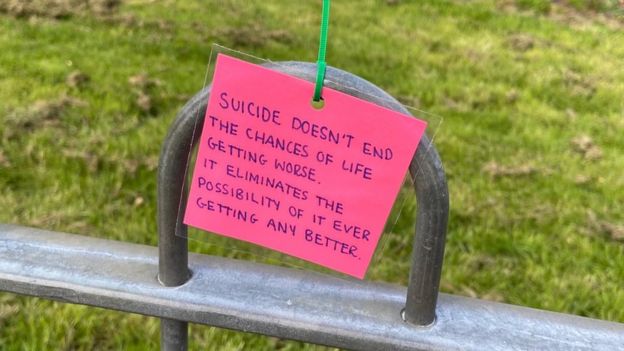 James Donaldson notes: As I’m slowly getting on top of my physical health issues, I am turning more and more of my time and efforts towards mental health issues, especially pertaining to our young people and student-athletes.
James Donaldson notes: As I’m slowly getting on top of my physical health issues, I am turning more and more of my time and efforts towards mental health issues, especially pertaining to our young people and student-athletes.
Having gone through a recent bout of depression and suicidal thoughts myself, I realize now, that I can make a huge difference in the lives of so many by sharing my story, and by sharing various resources I come across as I work in this space. http://bit.ly/JamesMentalHealthArticle
Start by listening without judgment, not trying to ‘fix’ him/her
When kids are young, parents are used to swooping in and rescuing them whenever they need help. As your kids get older and their problems become more complex, you have to transition into more of a supporting role, and that can be difficult. This is especially true for teens who are struggling with depression. They need help to get better, but first, they have to want that help.
Signs your child is depressed:
- Has she been sad or irritable most of the day, most days in a week for at least two weeks?
- Has she lost interest in things that she used to really enjoy?
- Have her eating or sleeping habits changed?
- Does she have very little energy, very little motivation to do much of anything?
- Is she feeling worthless, hopeless about her future, or guilty about things that aren’t her fault?
- Have her grades dropped, or is she finding it difficult to concentrate?
- Has she had thoughts of suicide? If so it’s crucial you have her evaluated by a mental health professional immediately. If the thoughts are really serious and there is an imminent threat, you will need to take her to an ER.
If your teen shows more than a few of these signs she may have depression that warrants professional attention. While you can’t make her want to get better, there are some things that you as her parent can do. And it starts with simply being there for her.
Be supportive
One of the most important things you can do for your teen is to work on strengthening your relationship. Try to build empathy and understanding by putting yourself in his shoes. You might be frustrated that he seems down and irritable a lot of the time and doesn’t seem to be doing much of anything to help himself. But if there isn’t much in his life that is making him happy, or something intensely disappointing has happened to him, it’s understandable that he might avoid things he used to enjoy and retreat to his room. Depression makes even doing the smallest things more difficult.
Try to validate his emotions, not his unhealthy behavior. For example, you could say, “It seems as though you’ve been really down lately. Is that true?” Make it clear that you want to try to understand what’s troubling him without trying to problem solve.
Be compassionately curious with him. Ask him questions about his mood gently, without being emotional. Even parents with the best intentions often don’t realize that their concern can come across as critical rather than loving. Do not be judgmental or try to solve his problems, even if you disagree with his point of view. Listening to him talk about his problems might seem as though you’re highlighting the negative, but in fact, you’re letting him know that you hear him, you see him, and you’re trying to understand — not fix him. People don’t like to be fixed. Listening without judgment will actually make him more likely to view you as an ally and someone he can turn to when he’s ready to talk.
Try also to give him opportunities to do things without being critical of him. Instead of saying, “Honey, you should really get up and do something. How about calling an old friend?” you might say, “I’m going to the mall to do an errand. Let me know if you want to come with me, and maybe we can get lunch together.”
For some parents, this can feel passive, as though you’re not doing enough. But being there for him and communicating your acceptance of him is exactly what he needs from you right now. It’s actually a very active way to strengthen your relationship.
Accentuate the positive
Make sure you’re noticing the positive things your teen does, too. Going to school, holding down a part-time job, doing the dishes or picking up her brother from soccer practice: These are all good things she’s doing, and it’s important to recognize them rather than thinking, “This is what she should be doing.” We all like to be appreciated and recognized for doing a good job even when it’s expected of us.
Likewise, you don’t need to mention that you’re disappointed she isn’t hanging out with friends as much or taking the interest she used to in guitar, for example. She probably feels disappointed, too, and doesn’t need to be reminded of what’s not going well in her life. She doesn’t want to feel this way. If she could snap her fingers and feel better, she would.
Helping kids with depression get treatment
Some teens will want to go to therapy when you ask them and some won’t. For those who are resistant, know that they aren’t going to suddenly open up to the idea of therapy (or to you) quickly, but you can help guide them towards treatment by opening the door and then waiting patiently for them to walk through it.
Try saying, “I know you’re having a hard time, and I have some ideas of things that could help. If you’d like to talk with me about them, let me know. I’m here for you.” It’s also a good idea to ask her if she has any suggestions on how you might be able to help her. You might be surprised with what she has to say.
Be aware that your teen might tell you to back off. That’s fine; it’s her way — albeit a slightly irritable one — of telling you that she needs space. It’s normal for teenagers to want independence, and it’s important for you to respect that. You can respond by saying, “I’ll give you more space, but know that I’m here for you if you ever want to talk or hear my suggestions.”
If she does come to you wanting help, be prepared. Do your research. Find two or three therapists she can interview and tell her that she can choose the one that she feels most comfortable with, and thinks will help the most. Finding a therapist who is a good fit is extremely important, and making the choice hers will help her feel ownership over her own treatment, which is extremely important to teens and sets the stage for effective therapy.
It’s also important to know that there are several different kinds of therapy that might be helpful for your teen, including some well-studied behavioral therapies. Interpersonal therapy (IPT), cognitive behavioral therapy (CBT), and dialectical behavioral therapy (DBT) have all been shown to be helpful for teenagers with depression. Make sure that your child has had a thorough evaluation that includes treatment recommendations to help guide you.
Related: What Behavioral Therapies Work on Childhood and Adolescent Depression?
Many teens with depression benefit from medication, such as an anti-depressant. While therapy alone may be effective with mild to moderate depression, the best results are usually gained with a combination of medication and therapy. If depression medication is a consideration, it is strongly recommended that you make an appointment with a board certified child and adolescent psychiatrist (rather than a general physician) for a consultation.
Why depression treatment might not be working
If your child already is in treatment but it isn’t helping, ask him why he thinks that is. What isn’t helpful or what doesn’t he like about therapy? Are there things about therapy he does like? Maybe you can work together to find a therapist who does more of the things that he likes. If you do consider changing therapists, it’s important to discuss this with his current therapist before the decision to change is made. Many times, the therapy and/or the therapeutic relationship can be improved.
Keep in mind that therapy usually isn’t effective if the person in treatment isn’t committed to it, or is doing it to please someone else. Your child should want to get better for himself. Unfortunately, sometimes people have to get worse before they want help. But the good news is that if you lay the groundwork by strengthening your connection with him now, he’ll be more likely to turn to you for support when he’s finally ready.
Taking care of yourself
Lastly, it’s important to make sure that you’re taking care of yourself. It can be emotionally and physically exhausting to be a parent of someone who is struggling with depression. Know that you are not alone, and get support for yourself. Make sure that you make time to do things you enjoy and go out with friends. The phrase: happy mommy (or daddy) = happy baby (read: teenager) still applies!


